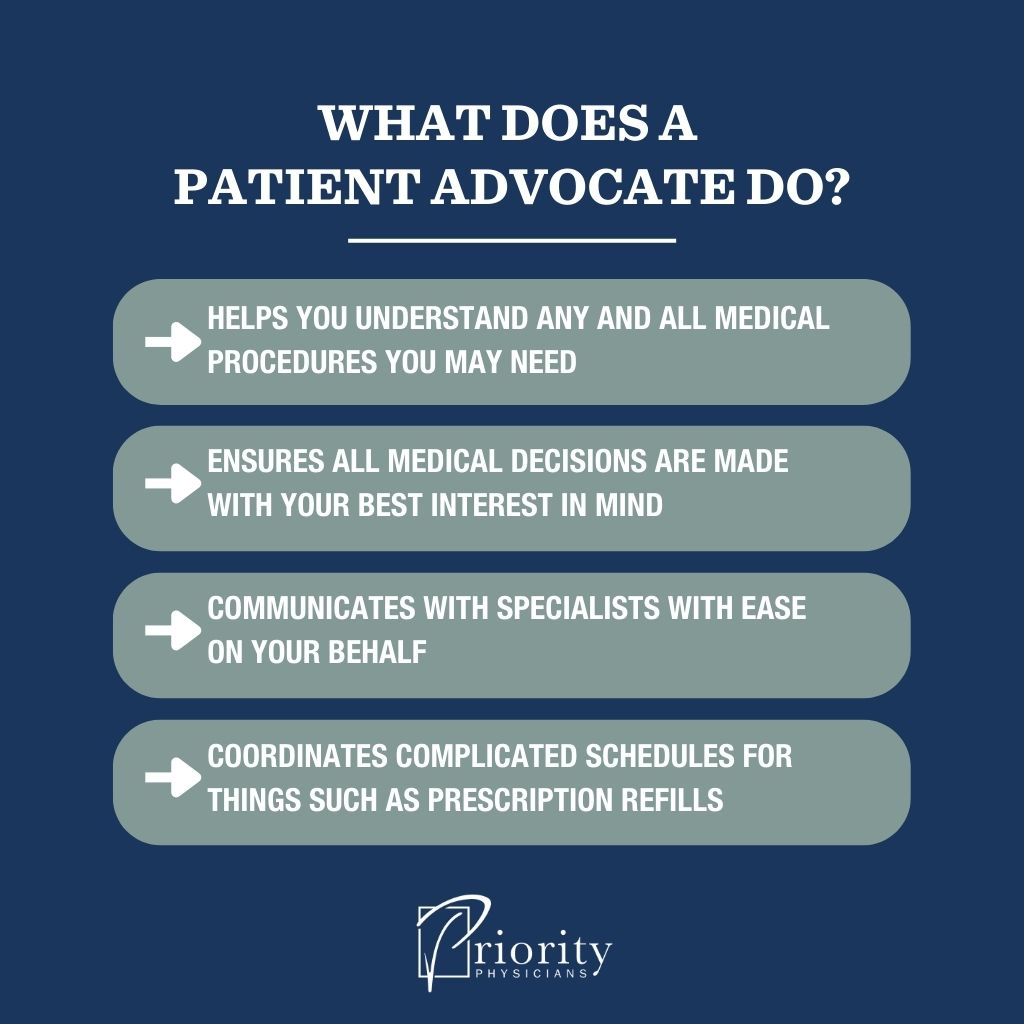When you hear the term “patient advocacy,” what comes to mind? Maybe a grandmother who needs someone to schedule her doctor’s appointments, transport her to and from visits, and organize her medications.
But it’s not just the elderly who need a patient advocate. Young, capable, and relatively healthy people need this kind of help, too.
Even something as simple as refilling a prescription requires knowledge of the healthcare system. You need to know how pharmacies work, how insurance works, and how to navigate these systems to get your medications on time.
Just the other day, I was working with a patient who had no idea how that process worked. She was blown away by the nuances — and she was a 40-something-year-old woman who was just trying to get her medications filled!
So, exactly what is a patient advocate and what do they do? From navigating the healthcare system to discussing details with specialists to interpreting test results, we could all use an advocate in our corner.
Shortcomings of Conventional Care
In the conventional healthcare system, it’s common for patients to see doctors who are overbooked and overwhelmed. The doctor will look at lab results, give some instructions, and run out the door — all while forgetting that they’re treating someone who has a quality of life.
If you tell somebody to do something that will hinder their quality of life, they’re not going to do it. It’s no surprise nothing gets accomplished! Making sure specialists stay focused on the person they’re treating is a challenge. This is where a patient advocate comes in.
What is a patient advocate? Let’s take a look.
What Is a Patient Advocate?
Having a patient advocate is like having a doctor in the family.
It’s what you would expect from a brother, sister, or parent that happens to be a qualified medical professional. They oversee everything. They answer questions and steer you in the right direction. They give you advice that some specialists might withhold out of fear of liability.
In the traditional care model, we’ve gotten away from shared decision making with the patient. And, oftentimes, patients don’t want to share in that decision making. When you have cancer and are presented with six different treatment options with complicated pros and cons, most patients just want somebody to tell them the best solution for their situation.
In our concierge, patient-advocate model, I think we do a great job of handing that true advice to a person, regardless of how complex the case is.
A patient advocate also breaks down recommendations that come from population-based studies. Ultimately, when it comes to your health, you don’t care what works best for the population. You care what works best for you.
For example, if you put 100,000 high-cholesterol patients on a statin and they all have lower cholesterol as a result, you’ve reduced the general population’s heart attack risk by 10%. That’s great for the population.
But if you’re a patient who takes a statin and experiences muscle aches, you probably won’t know whether the muscle aches are a side effect of the medication. You’ll keep taking the statin and have a lower quality of life, but that doesn’t matter in the context of the whole population. Yes, you don’t want to have a stroke or a heart attack, but there are other ways to prevent that.
That’s what a patient advocate does: provides alternatives when the conventional system fails.

What Does a Patient Advocate Look Like in Practice?
Imagine a patient gets diagnosed with cancer and is sent to see an oncologist. However, most patients are too overwhelmed to retain anything that happens in that first oncologist appointment.
That’s where a patient advocate — like myself — can be helpful. By physically sitting with the patient and talking to the oncologist, I take the pressure off the patient. I’m there to hear everything, so when the patient’s had time to process everything and says,
“What the heck just happened?”
I can go over everything again. If there are any questions, I can give answers, or I can contact the oncologist a lot more easily than the patient can for further information.
Alternatively, imagine a patient needs surgery. When a patient is debating surgery, they’re thinking about their life. They think about their job, their relationships, and how the surgery is going to impact all that. And then they get home and ask,
“Am I going to have an open surgery or a laparoscopic surgery? I missed the whole point of the consultation!”
Me being there to facilitate that question or conversation and also recall it down the road is helpful. We can stay unified as a team, moving forward to do what’s best for you.
Sometimes you send a patient to a subspecialist because you want answers to one specific question, and the subspecialist goes off on a tangent and you don’t get that answer.
It’s sort of a wasted consult, and then you have to wait months to get the chance to ask that question again. A patient advocate will make sure everyone stays on topic.
And, to revisit the pharmacy situation from earlier, a patient advocate can regulate complicated treatment schedules. If you have a monthly prescription, you’re locked out of refilling for 28 days. But say you’re going on a two-week vacation in three weeks. You’re going to run out of medication if nobody is thinking ahead.
At Priority Physicians, we act as your patient advocate. We organize that scheduling for you. We can problem-solve to find a solution before it becomes a problem.
The pharmacy system is so procedure-oriented that there’s no accounting for how life actually happens. I’ll be by your side to help you understand that system and get your medications on time.
Why Did We Make Patient Advocacy Standard in Our Practice?
Often, conventional healthcare treats conditions first. It doesn’t necessarily look at people. But we believe the best healthcare model puts people first.
Patient advocacy is one of our practice’s best-kept secrets. It’s not something that attracts people to our practice, but it’s something people realize the value of after they experience it firsthand.
Conventional healthcare is sick care. Conventional doctors wait for bad things to happen, whereas a patient advocate works to prevent bad things from happening.
In an insurance-based model, doctors get paid nothing for prevention. They only get paid when bad things happen. Meanwhile, the membership-based model of medicine allows doctors to function as a patient advocate — to look at the future, anticipating things that might happen and trying to prevent them. There’s nobody else doing that.
In What Other Ways Am I a Patient Advocate?
Everything I’ve described so far happens in an outpatient visit. But what happens if you end up in the hospital?
In our model, we still see all our patients in the hospital. No other primary care doctors in the traditional model do this because it would be impossible to sustain. But that duality is so important — there’s medicine, and then there’s the social side of medicine.
When you visit the hospital, the dissemination of information is vital for both doctors and families. If a patient is woken up at 4 a.m. when a doctor is rounding and is told important information while they’re half asleep, spouses and kids will likely hear a completely different story when the patient relays that information at 10 a.m.
One of the simple things I do is talk to people, read their chart, and tell them what’s really going on. Then I take it a step further and talk to the specialists. I make sure that the cardiologist is talking to the GI doctor and that they aren’t going to put you on a medication that will hurt your stomach, and vice versa.
We want to believe those gaps in communication don’t happen, but they do. Getting everybody on the same page is extremely helpful.
Patient Advocacy: Final Thoughts
As you can see, patient advocacy isn’t just for the most vulnerable. It’s also for the young, the healthy, the strong, etc. At the end of the day, anyone and everyone can benefit from having a certified healthcare specialist in their corner.
So, what is a patient advocate? A friend, a helper, and someone you’ll soon realize you can’t live without.

